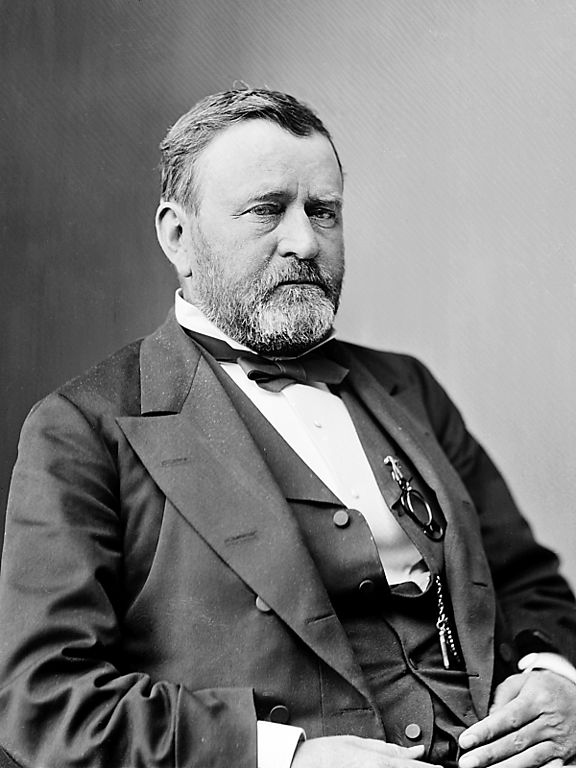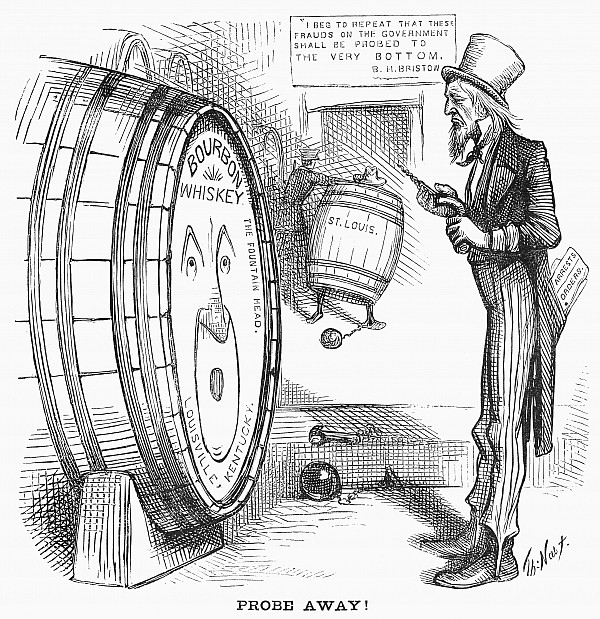Ulysses S. Grant had to respond to more charges of misconduct that took the form of financial corruption than any other president.
-
February/March 2021
Volume66Issue2

Ulysses S. Grant had to respond to more charges of misconduct that took the form of financial corruption than any other president. No department escaped congressional investigation. The only cabinet post ignored in the following account is that of the postmaster general, and the omission is deliberate; charges of continuing misappropriations of funds in the postal service will be treated in the analysis of the Star Routes under Presidents Hayes, Garfield, and Arthur. In addition to cabinet members, Grant's secretaries, members of his family, and the President himself were accused of abusing power that derived from his office.
Historians H. Wayne Morgan, Ari Hoogenboom, and others re-evaluating the Grant administration find its reputation for unbridled, unprecedented, and unsurpassed corruption exaggerated. Hoogenboom suggests that one of the reasons there was so much talk about corruption at the time was that at last some people, including Ulysses S. Grant, wanted to do something about it. He stresses, for example, abolition of the moiety system during Grant's administration rather than the notorious abuse of it by one of its last practitioners, John Sanborn, whose contract is discussed below. He credits Grant with appointing the first Civil Service Commission rather than blaming him for abuses that made later civil service reform essential.
Whisky Frauds
Whisky distillers and Internal Revenue Commission agents often made false reports of production to avoid tax. Such practices were common as far back as the Lincoln administration. Investigation later made it clear that a large number of government employees joined people in the industry in depriving the country of revenue. In St. Louis virtually every agent was believed to be involved. And complicity either in the frauds themselves or in the acceptance of bribes to prevent the exposures of the frauds reached to President Grant's closest associate, his secretary, Orville E. Babcock, and perhaps the Grant family itself.
It must be acknowledged that there was a partisan component to the investigation of the Whisky Frauds. Benjamin Helm Bristow, Secretary of the Treasury, wanted to be president. His reputation was based largely on his relentless exposure of the Whisky Frauds, and he became a hero of a major anti-Grant wing of the Republican Party. There is little to suggest that Bristow slanted the investigation to embarrass the Grant wing of the party, but many, including the President, believed he did.
There had always been strong political opposition to Grant within his own party in the state of Missouri. In February, 1870, he appointed a loyalist, General John A. McDonald of St. Louis, supervisor of revenue for Missouri and six other states. Grant knew McDonald socially but not well; Babcock supported the appointment.
On June 3, 1874, Bristow, on being named secretary of the Treasury, began his investigation of records dating back to 1870. He determined that 12,000,000 to 15,000,000 gallons of whisky escaped tax annually. Congress appropriated $125,000 for an investigation by the Secretary. On February 11, 1875, Bristow received a letter from George W. Fishback, publisher of the St. Louis Democrat: “If the Secretary wants to break up the powerful ring which exists here, I can give him the name of a man who, if he receives the necessary authority and is assured of absolute secrecy about the matter, will undertake to do it, and I will guarantee success." The man, Myron Colony, was a writer for the newspaper.
On March 1, 1875, Bluford Wilson, Solicitor of the Treasury and Bristow's chief assistant in the investigation, appointed Colony as an agent of the Secret Service division of the Treasury Department. Colony and Wilson worked out a complex and successful system of catching the perpetrators of the frauds.
Wilson told the House of Representatives Select Committee Concerning the Whisky Frauds that in late April, 1875, John McDonald broke down in Bristow's office and confessed to a central role in the Whisky Frauds. He did so because of strong evidence amassed by Colony and Wilson. Regaining his composure, McDonald now called on Wilson and, in return for immunity, offered to obtain delinquent revenues from the distillers. He urged Wilson not to seize the distilleries, in a full-scale prosecution of the case, because “the party interests in his state and his district would be greatly damaged…” McDonald, according to Wilson, “spoke of his own great and powerful influence in the West...” Wilson heatedly responded that if it were in his power he would “dismiss him [McDonald] from the public service.”'
McDonald, in a book carrying his version of the story, ignored the Wilson conversation, but referred to similar hints of damage to the party in a talk with Bristow. He claimed that Bristow “with some anxiety... in his face, ... inquired if I intended talking with the President...” McDonald said that he did and reported that he repeated to Grant that damage would be done to the party if the cases were prosecuted. He urged that the evidence be burned; Grant reportedly thought sealing it would be better. McDonald alleged that he received assurances that only distillers and not government men (and hence not party men) would be prosecuted." There is no corroborative evidence with respect to this conversation.
Wilson told a different story. He testified that he was instructed to prepare a digest of firm evidence. With this dossier, Wilson and Bristow visited the President. Asked by a committee member if Bristow said explicitly at that meeting that McDonald was a confessed guilty party, Wilson replied, “... he did not, for the reason that it appeared at the interview that the President and the Secretary had previously been in conference touching that subject and that the President understood that branch of the case quite as well as General Bristow did.”

By May 13, 1875, some 350 men, from Galveston to Boston, in both the government and distillery industry, were arrested. When the cases were discussed in the capital, Bristow told Hamilton Fish “that Babcock is as deep as any in the Whiskey Ring, [and] that he has most positive evidence. ... Bristow also told the Secretary of State that McDonald was the “centre pin of the plot.”
When Bristow and Fish broached the subject of the ring in general terms with the President, Grant said: “Well, Mr. Bristow, there is at least one honest man in St. Louis on whom we can rely-John McDonald. I know that because he is an intimate acquaintance and confidential friend of Babcock's.” Bristow responded: "Mr. President ... McDonald is the head and centre of all the frauds. He is at this very time in New York ready to take a steamer on the first indication at any effort to arrest him.”
In July, 1875, Attorney General Edwards Pierrepont and Bristow went to Long Beach and reportedly told Grant that Babcock also was criminally involved in the case. Grant did not comment on this accusation, but wrote: “Let no guilty man escape if it can be avoided. Be especially vigilant ... against all those who insinuate that they have high influence to protect, or to protect them.”
Grant clearly was troubled by the whole matter. He was told by friends of Babcock that Wilson was spying on the President. He appeared to think that somehow Babcock was being made a scapegoat. He did not fire or suspend his secretary, but he sought to help him defend himself. On December 2, 1875, General Babcock wrote Grant formally requesting a military court of inquiry. In the cabinet this was acceded to by even dubious members, since none felt that such a hearing would supersede a civil court action.
Grant had three generals appointed who were believed to be sympathetic to Babcock. Grant also ordered Attorney General Pierrepont to direct the prosecutor, United States Attorney David P. Dyer, to turn over to the court of inquiry evidence relevant to Babcock's case that had been gathered for the grand jury. Dyer's response was to go to the grand jury which, on December 9, 1875, returned a true bill accusing Babcock of conspiracy. With Babcock now before a civilian court, the military tribunal was disbanded.
Accusations reached ever closer to Grant. In January newspapers implicated Frederick Dent Grant, the President's oldest son, and Orvil Grant, his brother, in the Whisky Ring. Grant asked Pierrepont to get the reporters before a grand jury and act on their evidence if they had any, and publish the reporters' names if the charges proved false.
By February 8, 1876, Grant felt besieged. Manifesting “a great deal of excitement,” he confided to his cabinet his feelings about those pursuing him: “... they had taken from him his secretaries and clerks, messengers and doorkeepers; that the prosecution was aimed at himself, and they were putting him on trial; that he was as confident as he lived of Babcock's innocence. ...”
Grant spoke of going to St. Louis to testify in Babcock's behalf. Fish and others urged that he not do so. Instead he gave a deposition, taken February 12, 1876, by Lucien Eaton, for the prosecution, with cross-examination by W. Cook, for the defense. Secretary Bristow and Attorney General Pierrepont were present as was Chief Justice Morrison R. Waite, who notarized the document.
Read at the trial on February 17, it was believed to have contributed significantly to Babcock's acquittal on February 28, 1876. He was then replaced as Grant's secretary by U. S. Grant, Jr., the President's second son. Babcock, who apparently had put beside no substantial savings, became an inspector of lighthouses and drowned at Mosquito Inlet, Florida, in 1884.
Benjamin Helm Bristow appeared before the Congressional Investigating Committee in July, 1876. By then he had left the cabinet and was estranged from Grant, but at the hearing he refused to testify about “what occurred between the President and myself, ... which ... I think is a matter of the highest privilege, of which I have no right to speak at all” Bristow was pressed repeatedly to tell the committee about Grant's role while the cases were being prosecuted. He said this would require him to discuss conversations with the President and, concluding his testimony, said, “I decline to do so."
General McDonald went to jail. In the book he wrote to prove that others should have been there instead, he made a strong case for Babcock's guilt. Many of the documents he cited, and others, are in the Bristow Papers in the Library of Congress. This evidence suggests that Babcock was guilty.
McDonald also said Grant was guilty of criminal involvement. In this accusation he could cite no documents similar to those implicating Babcock. One authority, William Hesseltine, wrote, “McDonald attempted to prove Grant a member of the ring, but failed to establish his contention.”
Adapted from a longer essay which originally appeared in Presidential Misconduct: From George Washington to Today, edited by James M. Banner, Jr. Published by The New Press. Reprinted here with permission.

